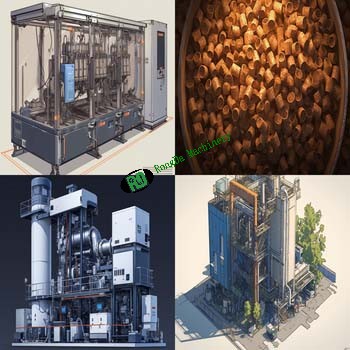Welcome to Rongda Machinery Co., Ltd
Toggle Navigation
A biomass pellet combustion system is a modern heating technology that utilizes processed organic materials—primarily wood residues and agricultural byproducts—to generate thermal energy. As part of the global transition toward renewable energy, these systems offer a practical replacement for fossil fuel-based heating while reducing carbon footprints.

Operational Mechanics
The system automates fuel delivery and combustion processes. Biomass pellets, manufactured from compressed sawdust, crop stalks, or forestry waste, are stored in integrated hoppers. An auger mechanism feeds the pellets into the combustion chamber, where electronic ignition ensures consistent flame output. The pellets’ standardized size and low moisture content (typically below 10%) enable efficient combustion with minimal residue.
Key Advantages
Enhanced Thermal Efficiency Advanced combustion chamber designs achieve thermal efficiencies exceeding 85%, with premium models reaching over 90%. Compared to conventional coal boilers, this translates to approximately 30% less fuel consumption for equivalent heat output.Eco-Friendly Performance Combustion emissions primarily consist of CO₂ offset by the carbon absorbed during biomass growth, creating a carbon-neutral cycle. Independent tests show particulate emissions at just 10% of coal-fired systems, with negligible sulfur oxide release.Cost-Effectiveness In northern China’s heating markets, biomass pellets reduce operational costs by about 40% compared to natural gas. Government subsidies for renewable energy adoption, such as China’s Clean Heating Initiative, can shorten ROI periods to 3–5 years.
Practical Applications
The nutrient-rich ash byproduct (containing potassium, phosphorus, and calcium) serves as agricultural fertilizer after processing. Modular designs accommodate diverse needs, from single-household units to industrial-scale multi-burner configurations. Smart controls now enable remote temperature adjustment and energy monitoring via mobile apps.
Market Adoption
Over 60% of detached homes in Scandinavia use pellet heating systems. In China, provinces like Shandong and Heilongjiang have implemented centralized biomass heating networks for agro-industrial parks. Emerging carbon credit trading mechanisms further enhance economic viability by monetizing emission reductions.
By combining technological innovation with environmental benefits, biomass pellet combustion systems are reshaping global heating practices—offering households and industries alike a cleaner, economically sustainable path to decarbonization.